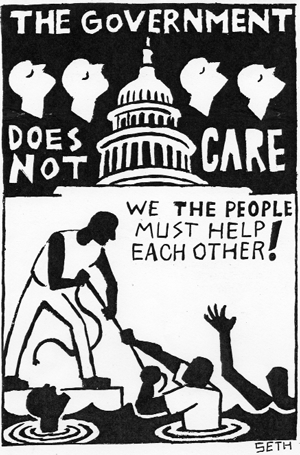When Fighting “the Man”, Don’t Become “the Man”

As many governments around the world shift towards being conservative (read: anti-LGBTQ), queer activism is seeing a resurgence. Pride parades are having discussions about whether or not to welcome uniformed police, for example, who have often antagonized and harassed local queer communities. Bathroom bills that are transphobic and ignore nonbinary people completely are being fought across the United States, where I live. Russia, Uganda, China have all been in the news for government-sanctioned cruelty to LGBT people. It can feel like a dystopian nightmare.
Granted, for marginalized folks, we’ve BEEN living in a dystopian nightmare for a while, so learning to survive is nothing new. We’ve been discussing ways to take care of each other through mutual aid strategies for years. Still, for other folks, this feels brand new and they’re scrambling to figure out how to put one foot in front of the other when every step hurts.
With that in mind, it’s important to stay conscious of power dynamics, especially within activist circles. Far too often organizing ends up being discussed by the people with the most institutional power (often seen through explicit and implicit racism, misogyny, classism, ableism, cissexism, heterosexism, etc), then carried out thanks to the labour of people with the least. By reflecting on how to make our political work fundamentally acknowledge disparities and marginalizations, we can center consent culture within our process, instead of relying on the entitlement we see everywhere else. We also need to remind ourselves that being called out when we mess up is a sign of trust that we want to do better, choosing to learn from our mistakes instead of being defensive and lashing out.
When organizing anything from a potluck to a protest, some folks use the phrase “step up/step back”. It’s often suggested as a way to remind people who speak up a lot to give other people a chance to shine, and to also encourage quieter folks to speak their minds. This simple principle being invoked at the beginning of a meeting or an action can help gently and proactively encourage people to share space at the table. That said, it’s also important to encourage and value active listening — not everyone has to speak, after all, and not everyone feels safe speaking in a public forum! Ensuring you have a good facilitator that can make sure everyone’s needs are met is vital for a productive, consent-centered meeting. It’s also a good idea to have a couple different ways of organizing so people can listen and learn in different ways — one group I work with has in person meetings as well as a online messaging group, so people can participate in a way that works best for them.
Another part of creating a consent culture within any social justice minded revolution requires that we not only allow people to opt out, but give them opportunities to opt in. While street-based protests and actions get a lot of media attention, they are not the only way for people to contribute to “the movement”! We need people able to offer childcare, people to provide food, people willing to give aftercare, people able to do jail support if needed. Focusing all our energy and praise on those in the streets means we aren’t acknowledging the unseen labour necessary for those actions to take place. Also, not everyone can risk arrest — trans and nonbinary people, Black and brown folks, parents, immigrants, working class folks, people with disabilities or mental health struggles, all risk a lot being arrested and all have been known to suffer more at the hands of police. By being vocally grateful to our comrades behind the scenes, we can help ensure that people feel good opting for supporting each other in a way that feels good for them.
No bones about it — a white supremacist, capitalist, patriarchal government wants to kill us, whether it’s in the United States, or Russia, or Australia, or Northern Ireland. It wants us isolated, hungry, and afraid. Fascism takes hold when people are scared and tired. And it’s reasonable to be scared and tired. This is terrifying and exhausting.
So let’s resist by helping each other not only survive, but thrive. Let’s do the hard work of unpacking our privileges and step back so others can step forward. Let’s teach each other how to fight, whether that be with our words or our weapons. Let’s read more from marginalized voices, and let’s fund the media that allows them to speak out. Let’s learn to use guns, to build houses, to grow our own food. Let’s learn how to acknowledge when we’ve hurt each other, and commit to restorative justice models of accountability so we can keep moving. Let’s remember that mutual care is an act of resistance. Let’s center consent instead of entitlement.
If our creation of a new paradigm does not reflect our stated values of anti-oppression, we run the risk of being another version of the same thing we protested against. By centering consent culture over our own egos and listening to each other more than we talk over each other, we stand a chance of building something better on the ashes of the political dumpster fires we see all over the globe.

Comments ()